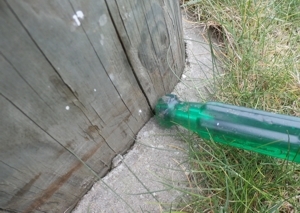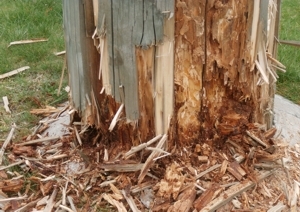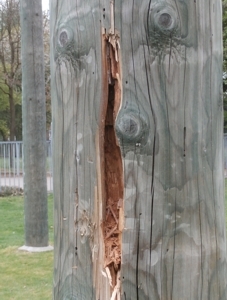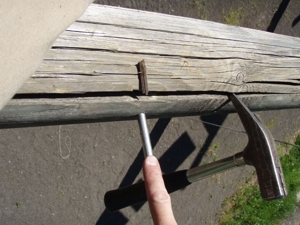Rot inside impregnated poles increasingly detected, especially when installed directly into ground or concrete
An ERCA inspector identified a significant number of rotten poles whilst inspecting ropes courses in the Netherlands. The problem was identified on treated poles which were buried in the ground. Rot was identified in the core of the pressure treated poles just beneath ground level (see sample Pict. 1 resp. sample Pict. 2) and also on different points up to 2 metres above the ground (see sample Pict. 3).
The problem can only be identified when inspecting very carefully to the core and usually only with the use of approriate tools (e.g. drilling, hammer + drift punch, ...). Inspection is more difficult for treated poles (those treated under pressure). Such poles often appear sound from the outside even though the core can be rotten. This is what was discovered in the Netherlands.
The problem was identified for poles...
- ... which were buried (into the ground) and
- ... which were pressure treated
|
In the case referred to above, the rot was found on poles that had been installed upright; however, experience suggests poles installed horizontally (Balance-Beam, Giant Ladder etc) are more likely to rot from the inside (see sample Pict. 4) as it is harder for water penetretrating shakes (cracks running parallel to the grain) to escape. Similarly, where there is not a good flow of air (e.g. concealed behind plates) rot is likely to be accelerated. Immediate steps by ERCA:
Recommended steps for RC inspectors and operators: The well known phenomenon of internal rot (in pressure treated poles) can be attributed to a number of factors. In any case great care must be taken when inspecting timber poles of all descriptions. If you are in any doubt about the integrity of your poles then please contact a reputable and experienced inspector. Here you can find a list of ERCA certfied inspection bodies. |
Sample Pict. 4: The part of the drift punch that is not covered by the finger has been inserted in the horizontally installed log before. Even if the wood |
Please Note:
The aim of releasing ERCA notices is to disseminate up to date information which will help to avoid accidents on ropes courses. We are committed to providing unbiased information about the sequence of events and the causes of accidents. We are neither in the position to, nor do we have the intention of, undertaking in-depth on-the-spot investigations.
_______________________________________
European Ropes Course Association
Safety Commission - Contact:
Meik Haselbach
Im Brühl 18b
D-79295 Sulzburg
Telephone: +49 - (0)7634 - 503 281
Fax-Server: +49 - (0)3222 - 377 82 62






